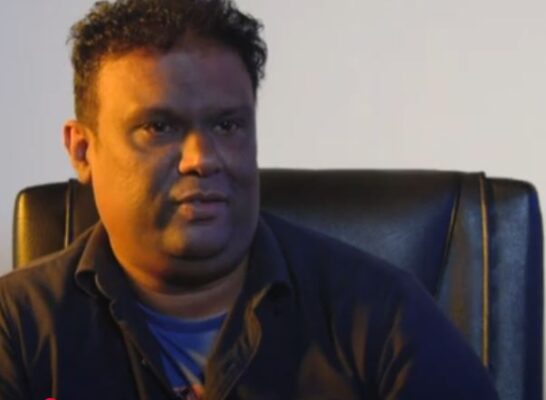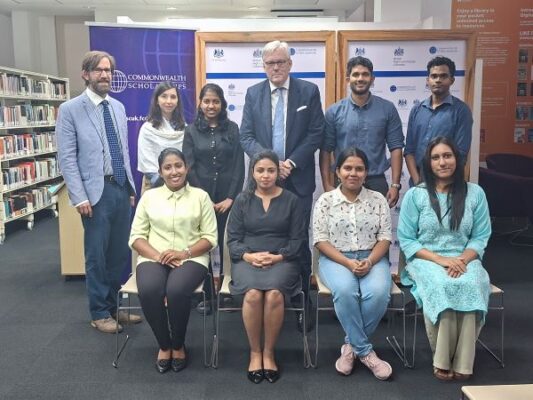Harpo the irrepressible restaurateur turns 20 – by Malinda Seneviratne
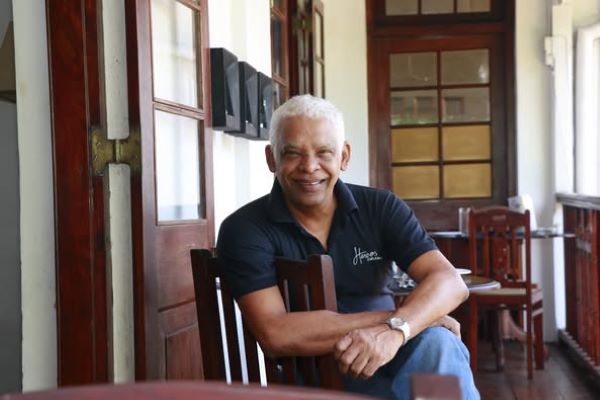
Source: https://www.facebook.com/malinda.seneviratne.7
I first went to ‘The Commons Coffeehouse’ a few years now. I can’t remember the first day but I think I must have purchased a ‘Flat White.’ That’s what I’ve always got there. Today, if I stop at the counter, this is the question that is invariably put to me: ‘a flat white?’
They know, even though I don’t always buy something. I mostly sit in some corner writing something or playing online chess. They don’t mind. It’s my place. It’s everyone’s place. A common ground. You can come, stay and leave. As you please.
It took me a while to learn that Harpo Gunaratne owned the place. It took me even longer to learn that he’s been running the place for 20 years. Somewhere along the way, we became friends. I’ve written about him and his little restaurant that has more or less become my ‘day home’ on a few occasions, but I write now following an interview. Harpo turned 20. Sorry, Harpo the Restaurateur turned 20.
Harpo was a brand long before Harpo the Restaurateur emerged from a corporate world where his hands were full of all things related to food, hospitality and entertainment. Today, as he celebrates 20 years as a restaurateur, Harpo can be justifiably proud about what he has achieved, although this self-effacing man talks and acts as though it’s all an aggregate of day’s well-lived doing what makes him happy, i.e. putting smiles on other people’s faces.
Harpo has a name. Lalith Clarence Gooneratne. His family must have used it when he was a child, but he was re-christened, so to speak, as ‘Harpo’ by his father when he was but a toddler because he resembled Harpo Marx. That name stuck. It became a brand or rather; he turned it into a brand.

It all began when he and Gabo (Gamini Peiris) began Deejaying in the early 1980s, i.e. not too long after he left school. Young people in Colombo who loved music and dancing knew the duo. Harpo and Gabo made music.
Music was a natural option for him since nothing inspires greater passion in him than people. Obviously the hospitality industry was the other natural option. Harpo knew the two went together and soon developed himself into what could be called the perfect and complete package.
Having followed a three year course at the Claremont Hotel School, Harpo joined the Capri Club, in 1983. He hasn’t stopped since and therefore counts more than 40 years of experience in the industry. In that 40 years literally hundreds of thousands of patrons have enjoyed the hospitality and entertainment of places like the Ramada Renaissance Hotel now known as Cinnamon Lakeside and where the famed ‘Library Lounge and Music Room’ was born, Hilton Colombo, Hilton Dalian (China), Hilton Osaka (Japan) and other mixed-development projects in Sri Lanka such as the World Trade Centre, Crescat Boulevard, & Millennium Theme Park. Harpo either managed or was consulted by such high-end entities in the corporate sector. The industry knows Harpo. The clientele simply enjoyed the fruit of his labor and that is what pleases him most.
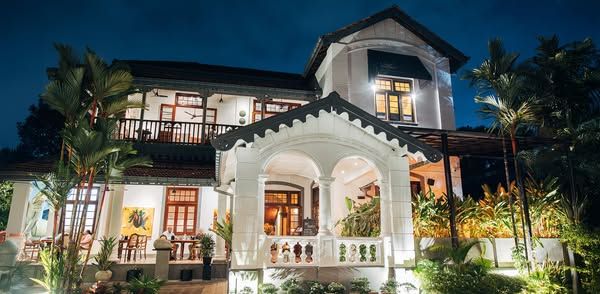
So I sat him down at ‘The Commons Coffeehouse,’ the quaint hangout-plus-food place on Ernest de Silva Mawatha frequented by people of all ages, some of whom become regulars to the point that it’s a ‘must stop’ in their daily routines. I’ve seen Harpo often, especially in the mornings when he drops by to check on things. We exchange greetings or just nod in acknowledgement and sometimes talk for a few minutes. This was different. I wanted to know the why and how of it all. He ordered coffee and asked me if I needed anything else. A Flat White, as always, was good enough.
I asked him why he moved away from what arguably was a comfortable gig, so to speak. Harpo has a simple response: ‘I was done working for others.’
And he explained: ‘I had already completed about 25 years in the corporate sector as an entertainer, hotelier, consultant etc., both local and foreign. My thing was to manage other people’s headaches. So I decided to do my own thing.’
That’s how Harpo Productions, now Harpo’s Cafes and Restaurants, came into being and how Harpo became a full-time restaurateur.
‘This was the first project. I simply managed and operated. About a year later the owner asked me, “Why don’t you consider acquiring the brand?” I knew the numbers. I knew the business. And I knew “The Commons.” I agreed.’
It was, as he said, a functional coffee shop. The menu, the concept, the look and feel, this was all Harpo’s thing. He laid it out. He tweaked it. He leveraged his best asset, the brand Harpo.
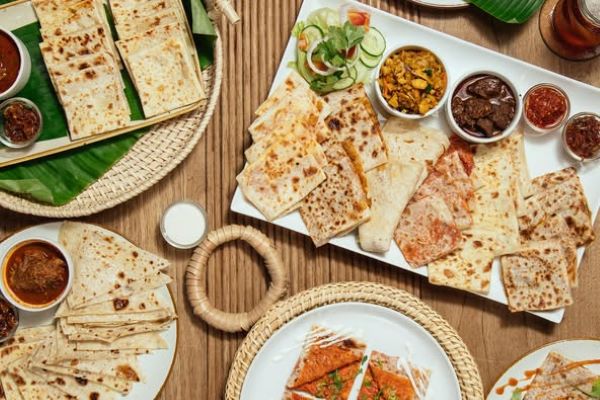
Harpo was already a household name. The Commons was a ‘family thing.’ An ideal match.
‘It was a first of a kind,’ Harpo explained.
‘The dining industry had expanded and got varied. But this was unique at the time. People come, they know what they want, the staff sooner or later figures out what the particular customer needs and delivers it. It was casual food, but good food.’
Harpo is right. While the kitchen staff is understandably invisible for the most part, those at the counter and those who serve, including the security personnel, seem to have become permanent fixtures but with a friendly, warm and human countenance. They are known and they know.
He acknowledged that the staff is a huge part of the brand’s success story. He explained the low staff turnover as a product of the way things are done.
‘It’s our culture: “look after your people and they look after you.”
Just a year ago, a second outlet was opened in Pitakotte. But Harpo or rather Harpo’s Cafes and Restaurants is not just a ‘Commons’ thing.
In 2005, Harpo opened The Bayleaf on what used to be called Gregory’s Road and is now Srimath R. G. Senanayake Mawatha, one of the first stand-alone Italian restaurants which too he had been managing for a year before acquiring it.
There are probably many who have never visited either of the two ‘Commons’ or The Bayleaf, many who have not been to Harpo’s Euro Med restaurant, Colombo Fort Cafe, which he opened at the Dutch Hospital around 2010, again one of the earliest to serve such cuisine, and many who don’t know about ‘SHOULDERS,’ a small unique Greek infused restaurant with an open kitchen in the promenade area of Havelock City which was launched in November 2023. They probably are unaware that Harpo has a property in Bengalaru, India, ‘Salone Ceylon’ which is a Sri Lankan fusion restaurant while selling among other things hoppers, ‘presented differently,’ as Harpo says. They wouldn’t know that his first overseas venture was to take the pizza brand to the Maldives, way back in 2008, but had to pull out because ‘it was a little too early for the Maldives.’
They would know the brand Harpo though if not for entertainment then for food, thanks to Harpo’s Pizza.
‘Since I was making pizza anyway at The Bayleaf, it made sense to arrange home-delivery. I introduced the concept of wood fire in pizza making. This was in 2008. We initially started from The Bayleaf but now we have four other outlets Pitakotte, Wattala and Nugegoda. We were also the first to make Regular 9″, Large 12″, Gigantic 19″ pizzas and the first square pizza, which is 22″ across.’
The names of these places tell a story. There’s a common touch to The Commons. Well, that common touch signatures the other places as well, but they too have unique stories. Fort Cafe was obviously inspired by the location, but ‘SHOULDERS ’ seems a direct draw from Harpo’s philosophy.
‘It’s a small place. So small that you keep knocking on shoulders. We say “sorry.” And so people communicate. So people get to know one another, become familiar.’
‘The Bayleaf’ made sense on account of the type of cuisine, given that it alludes to Greek and Roman history and is a symbol of love, strength, courage and victory.
The love was always there, but courage and strength were required in excess during those early days when an ongoing conflict could wreck anything and everything in the blink of an eye. Such qualities were also required in the aftermath of the Easter Sunday attacks of 2019, the Covid pandemic and the economic and political upheavals a few years later.
‘I started off at the height of the war. We invested at that time. We took a big risk. Also, it was just after the tsunami. So there were bombs and roadblocks. We took some big hits in the first four years or so, but we were strong as a brand. The name “Harpo” was known in the hotel, corporate and entertainment fields. I didn’t have to create from scratch. Doors opened. Simply, people knew me.
‘The most challenging times actually came later. We had to push through several crises. There was the parliamentary coup in 2018, the 2019 Easter Sunday attacks, Covid and the economic crisis when there was no gas, petrol, diesel and electricity. But we survived because first of all the brand was strong and secondly, we had an amazing team of around 150 people who stood with and by me.’
Harpo’s reasoning is remarkably simple: ‘If there is a down, there has to be an up.’
‘I stuck to my guns, people stuck with me, the team stuck together, we innovated, we made difficult decisions and had the courage to alter course when necessary. For example, I had to close down a hotel school in the South which I had run for about eight years, more as a CSR thing to introduce and groom young people to the hospitality industry.’
Harpo didn’t start the world’s first restaurant. Indeed, it wasn’t he who opened Sri Lanka’s first restaurant either. He won’t be the last, that’s for sure as well. And yet, originality seems to be Harpo’s thing.
‘I am a daydreamer. I read, I look around and find what’s missing.’
It’s true. No one did pizza before he did. No one offered Italian cuisine before he did. There were no coffee shops before ‘The Commons.’ The Greek and Mediterranean restaurants were firsts. He’s given us homemade pizza and all kinds of mouthwatering sauces. Who knows what else Harpo would get into next?’
Whatever it is, the underlying philosophy is unlikely to change. Harpo likes people to be comfortable. He is easygoing and creates spaces for the easygoing or simply makes it possible for the tense to shed their anxieties — he puts them at ease. So they come, they see, become comfortable and stay.
‘We’ve created spaces in Colombo for families, couples, executives and kids to come together,’ he said. Even unemployed, underemployed or unemployable graduates, I might add. Anyway, it’s generational. Kids who walked in with parents and ran around screaming their heads off later come with friends, lovers and business associates.
‘The Commons’ has got a new look, perhaps as part of the celebrations, but the feel is the same. Harpo is Harpo but he is acutely aware of changing times and circumstances and the need to adapt and innovate. He outlined the challenge thus:
‘The industry has a huge HR problem on its hands. We don’t have enough and properly trained people coming out to service the traveler. Hospitality is a low-hanging fruit and gives us a lot of income. It’s massive. We do have two-three schools but this is not enough. Hospitality management has to be part of the school curriculum. As a country, the private sector needs to get involved. It’s a fast evolving trade. We need to understand that people come, work for a while, obtain the training and experience and then go overseas. How do we meet the demand? This is a question that all stakeholders need to address.’
Harpo does his part. He sets things rolling. He has faith in what the country and the people have and are so ready to offer:
‘There’s a surge in tourism. We are a lovely country; we have so many things to offer. We have more cafes and restaurants now. It’s a growing sector.’
There’s been competition of course, but as Harpo points out the brand has stood its ground and passed the test of time or rather changing times. He wants to franchise his brands. He believes that ‘The Commons’ is scalable and so too his pizza. He plans to set up a training/grooming school in Jaffna.
Harpo, at 20, is as curious as a child, as enthusiastic as a teen, as driven as someone stepping into an adult world and as wise as someone who’s seen enough to be sober, unanimous and grateful.
Harpo is confident. He is confident about Sri Lanka. He believes that hospitality is a sleeping giant. He’s waking it up. That’s what he’s being doing in his own way. Setting things in motion. ling through it all.




















